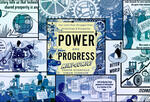Ideas
Made to
Matter
Insights for your work
From MIT Experts

Latest
Technology
Innovation
Financial Markets
Data
Future of Work
![]()
Organizational Culture
![]()
Human Resources
![]()
Future of Work



Workforce Intelligence
Strategies to transform skills, roles, and human potential across your organization.
The Latest

Supply chain sustainability: Top ways firms track Scope 3 emissions
By
A new report from MIT shows companies remain committed to supply chain sustainability. Policy and freight decarbonization are emerging priorities.
Who benefits from AI? New comic explores technology’s impact on labor
By
Download “Power and Progress: The Mini-Comic!” for free. A new comic book adapts MIT Nobel Prize-winning economists’ work on how AI affects workers and shared prosperity.
New MIT Sloan courses focus on deep learning, gen AI, and fintech
By
Additions to the MIT Sloan 2025 – 2026 course list include Intensive Hands-On Deep Learning, AI and Money, and The Arrhythmia of Finance.
What the bond market has to say about generative AI
By
How do generative AI model releases impact consumption expectations? New MIT Sloan research shows large, unexpected reactions in the bond market.
Flexible data centers can reduce costs — if not emissions
By
Data centers that shift workload to different times of day save money, but the environmental impact depends on the local grid.
Why innovators can’t afford to ignore geopolitics
By
Tariffs, sanctions, export controls, and industrial policies now shape how companies hire talent, build supply chains, and choose markets.
How artificial intelligence impacts the US labor market
By
New research from MIT Sloan shows that companies can see substantial gains by putting AI to work — with that growth translating into jobs.
How to boost your organization’s AI maturity level
By
New research highlights four areas leaders must address as they embed AI across their business.
AI implementation strategies from MIT Sloan Management Review
By
Value creation is the true measure of successful AI implementation. It starts at proof of concept and considers AI’s impact on an industry, not just a company.
Download: Workforce development in the age of AI
By
From MIT experts, strategies to transform skills, roles, and human potential across your organization.














